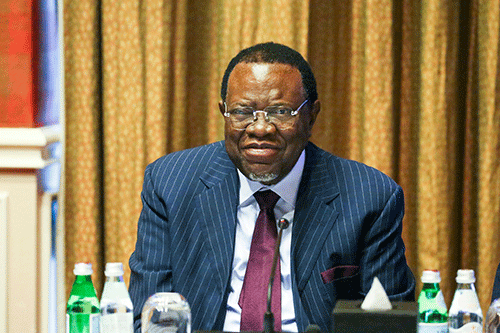Brain Xamseb
President Hage Geingob, as Namibia’s chief diplomat, is obligated to further its political, economic and social objectives.
In this area, Namibia is required to make constant overtures to other countries to promote bilateral friendship and multilateral partnerships.
Some of these engagements emanate from historic friendship roles but always include present or future needs for services or products.
For example, not only is Cuba a historic friend of Namibia, but it has a globally renowned excellent education and health services from which Namibia derives direct benefits.
So, we will always seek to maintain healthy bilateral relations with Cuba through government visits, student training, staff exchanges and others.
By the same token, the Chinese are renowned for their effective ability and speed in the transformation of society from poverty to prosperity in a short period.
Building on our historic friendship relationship, Namibia needs to tap into such know-how and trade with its vast market.
For this reason, we visit each other, including at the highest level of Presidents to continue strengthening our friendship and strategic relations.
From the above, even without touching on the investment role, we deduced that the inherent core functions of the President’s office require him to engage with local and external stakeholders to give effect to the intents of Namibia’s Constitution.
Without such collaboration, it will be impossible for the President to be effective in his governance mandate.
This explains why all high-performing countries the world over see their presidents engaging in frequent travel to seek new allies, maintain the old ones and secure concessions and benefits for their countries.
Thus, presidential travel is not unique to the Namibian President, and polemics around it is unnecessary, so is labelling him as “traveller in chief” a misnomer.
The President is obligated constitutionally to ensure the protection of the country’s territorial borders and sovereignty; the promotion of sustainable development of Namibian resources for national prosperity; the fostering of peace, unity and nation-building as well as the promotion of international relations for Namibia to shaping the global agenda of peace, stability and development.
All these functions involve a fair degree of unavoidable interaction for the President with the outside world and stakeholders, and it explains why he is empowered with executive decision-making authority to move the country and its people towards the highest stage of human development.
For this reason, we have to understand that the issue of travelling and missions is not about joyrides or wasting of money.
Peace, stability and security do not have a price tag, except the price of Namibian lives.
We can, therefore, not always expect returns in monetary terms.
Peace and stability are a return, and so is security.
If not so, we should try the opposites!
Also, from the above, we infer axiomatically that the President’s travels cannot simply be equated to the objective of investment promotion – even though that is one of his functions – as some have erroneously claimed.
In conclusion, there is nothing wrong with the President travelling on missions in the execution of his political, economic, security and diplomatic mandates, as the existing process, systems and institutions should function effectively – even in his absence to render the required services to the people of Namibia and address daily challenges.


